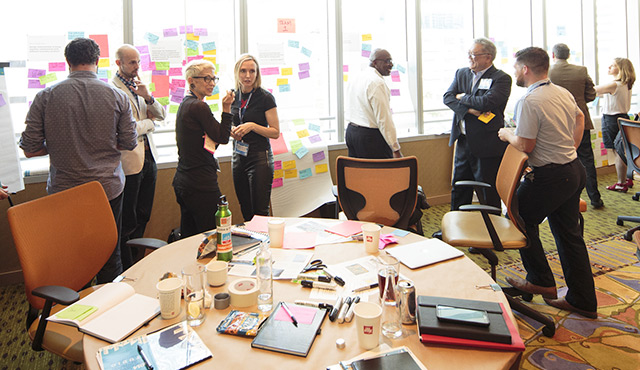
Insights from civic innovation studio evolving into action
Photo: Participants at the Civic Innovation in Action Studio in Miami. Photo by Tom Clark/For Knight Foundation.
Overview: Knight Foundation hosted 100 civic innovators at a Civic Innovation in Action Studio in Miami May 12 -14 to explore ways to harness talent, advance opportunity and promote robust engagement. RELATED LINKS
“Civic Innovation in Action Studio tees up ideas for better communities” by Michael Bolden on Knight Blog
“Putting ideas into action to build better cities” by Carol Coletta on KnightBlog
“Learning Lab gathers ideas on promoting community engagement” by Carol Coletta on KnightBlog
“Learning Lab gathers ideas on making the most of talent in our cities” by Carol Coletta on KnightBlog
“Innovators develop ideas on advancing opportunity” by Michael Bolden on KnightBlog.org
“Boston adopts new tools to engage residents in civic life” by Nigel Jacobs on KnightBlog
“Scaling an Etsy Economy for a changing workforce” by Dana Mauriello on KnightBlog
“Harriet Tregoning, identifying ideas to expand opportunities in cities” by Carol Coletta KnightBlog
“Encouraging more robuts acts of citizenship” by Adam Royalty and Scott Witthoft on KnightBlog
“Studio explores ideas for successful cities” by Carol Coletta on KnightBlog
“Civic innovators gather in Miami to build ideas for successful cities” by Michael Bolden on KnightBlog
“Innovators embrace broad themes of robust engagement” by Andrew Sherry on KnightBlog
“Studio developing ideas on harnessing talent of a changing workforce” by Anusha Alikhan on KnightBlog
“Studio produces trove of ideas to improve civic engagement” by Andrew Sherry on KnightBlog
We recently completed our Civic Innovation in Action Studio, a convening of 100 thought leaders from across the country; now the next phase of work begins. We’re honing ideas into experiments, developing ways to advance opportunity, harness talent in cities and make robust acts of citizenship normal. These experiments will be designed to help us understand how to get closer to some important goals that have proved elusive but are key components of our strategy here at Knight Foundation.
For instance, to advance opportunity in our cities one area ripe for experimentation is to learn more about how neighborhoods can attract and keep families with widely different incomes. That doesn’t happen often in our cities today. Yet, new research shows that having people of different incomes living in close proximity to one another is key to upward mobility in America. To tackle the challenge, civic innovators considered the manipulation of local talent and asset inventories, public events, zoning and development, and civic amenities to alter the composition of neighborhoods.
The approach was not to command and control bringing people of different incomes together. It was to entice it… to make it enormously appealing… and to leverage the widespread market interest in America’s core cities to make neighborhoods that are more diverse economically.
A second studio exploration focused on putting more talent to work in cities. As the concept of work and where and how it’s done becomes more fluid, can that be an opportunity to harness more talent for cities? Ideas ranged from positioning freelance work as “real work” for city officials and civic leaders by ranking cities on their friendliness to freelancers, to new digital platforms to match talent to work, to providing better, regular data on these fluid forms of work and their economic impact.
Our third studio considered a question that props up the other two aims (along with hundreds of others in cities): Can robust acts of citizenship become normal behavior in our cities versus something that occurs only occasionally or not at all. Not surprisingly, the topic proved vexing to participants. (Not surprisingly because we’ve had many questions and long debates at Knight on just what constitutes engagement and expressions of citizenship.) Participants proposed testing why people engage in acts of citizenship, exploring a current version of the social contract and the how and why of robust civic engagement, and building a suite of plug-and-play strategies for acting as citizens. Joanna Frank, executive director of Center for Active Design, even suggested using design to prompt active citizenship in the same way her center is using design to prompt physical activity.
Now the real work begins. With an inbox filled with additional thoughts, ideas and proposed experiments from so many who attended, the next steps look promising. We plan to fund some of the ideas, so stay tuned for details.
We predicted the studio would be a tightrope walk, and it was. But despite some moments of uncertainty and frustration, we made it safely to the other side, with lots of new insights from lots of new colleagues.
Carol Coletta is vice president of community and national initiatives at Knight Foundation
View summaries of the work on harnessing talent, advancing opportunity and promoting robust engagement.
Recent Content
-
Communitiesarticle ·
-
Communitiesarticle ·
-
Communitiesarticle ·


